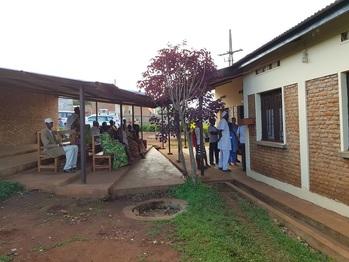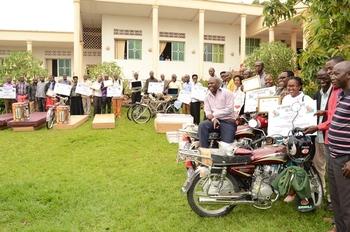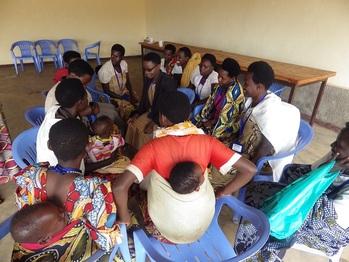Approach
The project is guided by the country’s National Development Plan and supports the implementation of the strategic plan of the National Programme for Reproductive Health. It operates in the provinces of Mwaro, Muramvya and Gitega and comprises two fields of action:
-
Strengthening the capacities of health districts and health centres to implement tailored quality management
The project plans and implements a quality competition in which health centres can participate. Quality assistants of the health districts support the health centres in using their resources to achieve improved quality. Personnel in the health centres play a central role in the change process. The staff members use questionnaires to evaluate the quality of their own services, particularly those relating to family planning, sexually transmitted diseases, sexual violence and sex education, including sex education for adolescents and young adults. They work together to develop an improvement plan and to monitor the implementation of this plan. A jury will select the winners of this competition. The overall process is being supported by project experts. The intention is to transfer methods and guidelines from the quality competition to the health districts.
-
Creating awareness of SRHR among young people through networks that encompass civil society, various sectors (educational institutions, municipalities, churches/communities, state family centres) and religious faiths
The project supports a total of 29 networks that have been established within the areas served by the health centres. Alongside the health centres and municipalities, schools, family centres, non-governmental organisations and religious leaders are represented in these networks. Thanks to the work of these networks, young and vulnerable people in particular are being educated on the issues of SRHR, family planning, sexually transmitted diseases, and sexual and gender-based violence. An association for young single mothers was also founded, through which they can provide support for one another and, as equals, can help to educate other young women and girls. In addition, the project supports dialogue between religious leaders, as well as dialogue with the health centres.
Results
Since 2013 the number of people using modern contraceptives in the three provinces in the project area has risen from 59,738 in 2015 to 64,991 in 2017 (sources: PNSR, 2016; PNSR, 2018).
So far, 68 health centres have participated voluntarily in the quality competition. These centres have, for instance, improved their waiting rooms and reduced waiting periods. They have paid increasing attention to confidentiality standards (particularly for young people). Hygiene in the centres has also been improved. The issue of family planning has been incorporated into medical treatment, nutritional advice and vaccinations. Better skills among quality assistants have strengthened the implementation of the quality management approach by the districts.


